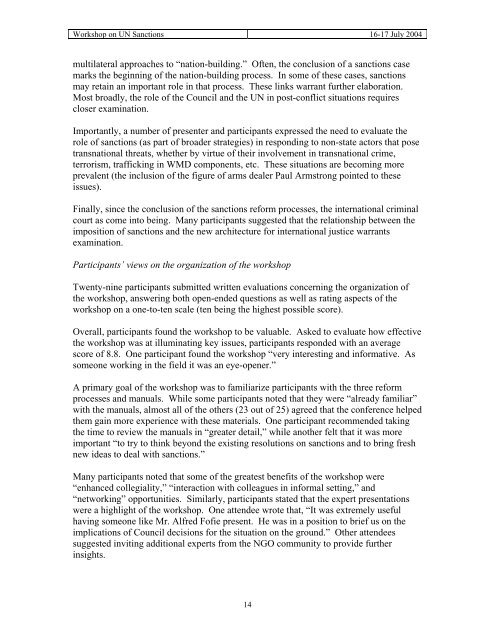UN Sanctions Reform - The Watson Institute for International Studies
UN Sanctions Reform - The Watson Institute for International Studies
UN Sanctions Reform - The Watson Institute for International Studies
You also want an ePaper? Increase the reach of your titles
YUMPU automatically turns print PDFs into web optimized ePapers that Google loves.
Workshop on <strong>UN</strong> <strong>Sanctions</strong> 16-17 July 2004<br />
multilateral approaches to “nation-building.” Often, the conclusion of a sanctions case<br />
marks the beginning of the nation-building process. In some of these cases, sanctions<br />
may retain an important role in that process. <strong>The</strong>se links warrant further elaboration.<br />
Most broadly, the role of the Council and the <strong>UN</strong> in post-conflict situations requires<br />
closer examination.<br />
Importantly, a number of presenter and participants expressed the need to evaluate the<br />
role of sanctions (as part of broader strategies) in responding to non-state actors that pose<br />
transnational threats, whether by virtue of their involvement in transnational crime,<br />
terrorism, trafficking in WMD components, etc. <strong>The</strong>se situations are becoming more<br />
prevalent (the inclusion of the figure of arms dealer Paul Armstrong pointed to these<br />
issues).<br />
Finally, since the conclusion of the sanctions re<strong>for</strong>m processes, the international criminal<br />
court as come into being. Many participants suggested that the relationship between the<br />
imposition of sanctions and the new architecture <strong>for</strong> international justice warrants<br />
examination.<br />
Participants’ views on the organization of the workshop<br />
Twenty-nine participants submitted written evaluations concerning the organization of<br />
the workshop, answering both open-ended questions as well as rating aspects of the<br />
workshop on a one-to-ten scale (ten being the highest possible score).<br />
Overall, participants found the workshop to be valuable. Asked to evaluate how effective<br />
the workshop was at illuminating key issues, participants responded with an average<br />
score of 8.8. One participant found the workshop “very interesting and in<strong>for</strong>mative. As<br />
someone working in the field it was an eye-opener.”<br />
A primary goal of the workshop was to familiarize participants with the three re<strong>for</strong>m<br />
processes and manuals. While some participants noted that they were “already familiar”<br />
with the manuals, almost all of the others (23 out of 25) agreed that the conference helped<br />
them gain more experience with these materials. One participant recommended taking<br />
the time to review the manuals in “greater detail,” while another felt that it was more<br />
important “to try to think beyond the existing resolutions on sanctions and to bring fresh<br />
new ideas to deal with sanctions.”<br />
Many participants noted that some of the greatest benefits of the workshop were<br />
“enhanced collegiality,” “interaction with colleagues in in<strong>for</strong>mal setting,” and<br />
“networking” opportunities. Similarly, participants stated that the expert presentations<br />
were a highlight of the workshop. One attendee wrote that, “It was extremely useful<br />
having someone like Mr. Alfred Fofie present. He was in a position to brief us on the<br />
implications of Council decisions <strong>for</strong> the situation on the ground.” Other attendees<br />
suggested inviting additional experts from the NGO community to provide further<br />
insights.<br />
14
















